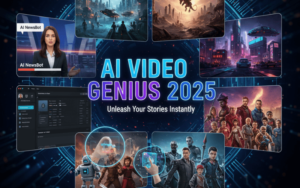In the fast-evolving landscape of 2025, Artificial Intelligence (AI) is no longer a futuristic concept but a present-day imperative for executive leadership. The ability to harness AI for smarter, faster, and more informed decision-making is rapidly becoming the defining characteristic of elite organizations. This guide delves into how AI is fundamentally reshaping the executive playbook and what you need to know to stay ahead.
Table of Contents

Why AI Decision Making is Your Competitive Edge in 2025
The sheer volume and velocity of data generated today are overwhelming for human analysis alone. This is where AI shines. By 2025, AI-powered decision-making tools are not just an advantage; they are a necessity for:

- Unlocking Deeper Insights: AI algorithms can sift through vast, complex datasets in real-time, uncovering hidden patterns, correlations, and trends that traditional analytics simply miss. This leads to a richer understanding of market dynamics, customer behavior, and operational efficiencies.
- Accelerated Strategic Planning: Imagine stress-testing critical business decisions against a myriad of potential scenarios before committing significant capital. AI enables advanced scenario planning and risk management, allowing executives to forecast potential futures with greater precision and adapt to uncertainty.
- Reducing Bias and Enhancing Fairness: Human decision-making is inherently susceptible to biases. AI, when ethically designed and trained on diverse data, can help mitigate these biases, leading to more objective and equitable outcomes in areas like hiring, lending, and resource allocation.
- Boosting Operational Efficiency: From automating routine tasks to optimizing supply chains and predicting equipment failures, AI streamlines operations, freeing up valuable human capital to focus on higher-value, strategic initiatives.
- Hyper-Personalization at Scale: AI enables businesses to deliver individualized experiences to customers, from tailored product recommendations to customized marketing campaigns, fostering stronger loyalty and driving revenue growth.
The AI-Powered Executive: Mastering AI Decision Making by 2025
Gone are the days when AI understanding could be fully delegated to the IT department. In 2025, executive-level AI literacy is paramount. This doesn’t mean you need to become a data scientist, but rather cultivate the ability to:

- Ask the Right Questions: Understand AI’s capabilities and limitations to identify where it can truly drive business value.
- Interpret AI Outputs Critically: Evaluate insights generated by AI, understand confidence levels, identify potential biases, and know when human oversight is crucial.
- Champion Ethical AI Deployment: Establish and enforce guidelines to ensure AI applications are transparent, fair, and aligned with organizational values and emerging regulations.
- Foster a Culture of AI Innovation: Encourage experimentation, provide training, and lead by example in adopting AI tools to enhance team capabilities and drive productivity.

AI Decision Making: Navigating Challenges and Pitfalls
While the benefits are immense, successful AI implementation isn’t without its hurdles. Elite executives in 2025 will be adept at addressing challenges such as:

- Data Quality and Governance: AI models are only as good as the data they’re trained on. Ensuring high-quality, unbiased, and secure data is fundamental.
- Ethical AI and Bias Mitigation: Actively addressing algorithmic bias and ensuring transparency in AI decision-making is crucial for building trust and avoiding reputational risks.
- Integration with Existing Workflows: Seamlessly integrating AI solutions into legacy systems and current processes requires careful planning and execution.
- Talent Development and Reskilling: The workforce needs to adapt. Investing in AI literacy and upskilling programs for your teams is essential to maximize AI’s potential.
- Measuring ROI: Clearly defining metrics and demonstrating the tangible return on investment for AI initiatives is vital for continued investment and buy-in.

Case Studies: Real-World AI in Action (2025 Outlook)
We’re already seeing powerful examples of how AI decision making is reshaping decisions across industries.

- Finance: AI-powered fraud detection systems are identifying suspicious transactions in real-time, while AI-driven portfolio optimization tools are helping financial institutions make more agile investment decisions.

- Retail: AI is enabling hyper-personalized shopping experiences, optimizing inventory management, and predicting consumer demand with unprecedented accuracy.

- Manufacturing: Predictive maintenance driven by AI leverages AI decision making to analyze machine data, anticipate issues before costly downtime, and enhance efficiency while reducing operational costs.

- Healthcare:Through AI decision making, healthcare is seeing advances in early disease diagnosis, personalized treatment plans, and streamlined administrative tasks.

The Future is Now
The Elite Executive’s Guide to AI-Powered Decision Making in 2025 is not about embracing a technological fad; it’s about leading with foresight and agility in an increasingly data-driven world. By strategically integrating AI decision making into your processes, understanding its nuances, and proactively addressing its challenges, you will not only drive unprecedented growth and efficiency but also redefine what it means to be a truly elite leader in the years to come.




